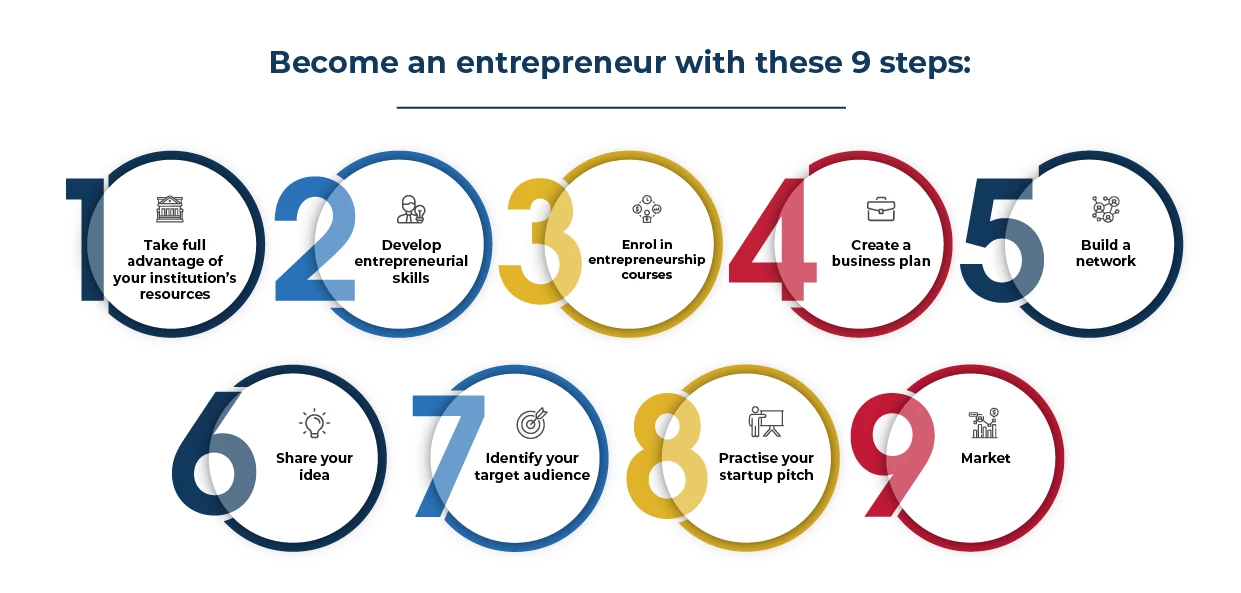Absolutely, anyone has the potential to be an entrepreneur, but the level of success can vary. Being an entrepreneur requires a mix of experience, determination and sometimes, education. While there are no strict requirements to become an entrepreneur, successful entrepreneurs come from all walks of life.
Do you know that over 60% of the UK’s workforce wants to start their own business?
The primary reason people in the UK want to start their own business is to make more money. The second most common reason is to become self-employed and be their own boss.
Starting a business might seem a bit scary at first, but here's some good news for students like you: Your higher education institution might provide the help and support you need to become a successful entrepreneur.
Studying for your bachelor’s and building a business takes a lot of creativity, determination and a clear plan. But it can be really rewarding if you set attainable goals and commit towards managing your time well, you can reap the benefits in the future.
Below, in this blog, we'll discuss how to become an entrepreneur while you're pursuing your bachelor's degree.
Become an entrepreneur during your bachelor's degree: 9 steps

1. Take full advantage of your institution’s resources
Many higher education institutions in the UK have entrepreneurship hubs where they help students with their business ideas. These institutions can provide you with resources and mentors.
One such institution is Global Banking School (GBS), which provides state-of-the-art resources for students to take their entrepreneurial skills to the next level. The institution has also recently opened the new Enterprise Hub at the Birmingham campus.
The Enterprise Hub offers a great, modern place where you, as a student entrepreneur, can work on your new business ideas. It's a place made for people like you to work together, be creative and find ways to bring promising ideas to life.
Furthermore, make sure your degree helps you to develop the skills to become an entrepreneur, with the tools you need to succeed. Talk to your teachers to learn how your institution supports student entrepreneurs.
2. Develop entrepreneurial skills
Being a successful entrepreneur is more than just having a good business idea. Entrepreneurs need to be visionaries who can dream big and see opportunities that others miss. They also need to have the skills to lead and manage a business and turn their vision into reality. Good communication is important too
|
i. |
Innovative |
Be creative. Always try to come up with better products or services and keep finding new ways to improve your business. |
|
ii. |
Passionate |
A genuine love for your product or service and care about your customers. |
|
iii. |
Decisive |
Make decisions confidently. Entrepreneurs are people who believe in themselves, learn from their mistakes and keep going even when they face challenges. |
|
iv. |
Resourceful |
Successful entrepreneurs can make the most of what they have and create new opportunities. |
|
v. |
Result-oriented |
Focus on getting results. Always aim to do better and don't settle for just reaching their goals. |
|
vi. |
Risk-taking |
Be willing to take smart risks, not reckless ones. Be ready to give up short-term rewards for bigger long-term success. |
|
vii. |
Persistent |
Not every idea will work, but the best entrepreneurs can bounce back from failures and keep working hard. |
|
viii. |
Flexible |
Initially, you might have to do many different jobs in your business, like selling, hiring and developing products. |
|
ix. |
Visionary |
Entrepreneurs don't just dream big; they make their ideas real and see future business opportunities. |
3. Enrol in entrepreneurship courses
Entrepreneurship courses will teach you the skills you need to become an entrepreneur. You'll learn how to plan, manage and put your business idea into action. Plus, you'll also learn the fundamentals of running a business, which can be really useful for your startup. These courses will also help to build your confidence in talking to people and convincing potential investors.
GBS offers an entrepreneurship course, “BA (Hons) Global Business and Entrepreneurship with Foundation Year”. It is designed to give you the essential elements to make the most of your entrepreneurial potential.
4. Create a business plan
Your business plan will be like a roadmap for your venture. Write down your vision and provide all the details about your future business. Not sure how to do it? The GBS Enterprise Hub along with the entrepreneurship course curriculum and teaching faculties can help you create a perfect business plan.
5. Build a network
Some institutions in the UK offer opportunities to connect you with CEOs and successful entrepreneurs through guest lectures or face-to-face meetings. Networking can also help you meet with potential investors who might want to invest in your business or collaborate with you.
6. Share your idea
If you don't have a clear idea yet, it's time to think about what kind of product or service you can offer and most importantly, what will make you different from others. Start by looking at common problems that your friends, family and the people you want to sell to experience. Some of the best new businesses solve simple problems that many people face.
Decide if you want to fill a need that's not being met or make something better that already exists. The first way helps you find your place in the market and stand out from competitors. The second way is more of a game-changer, where your business can be a new and better way of doing things.
7. Identify your target audience
Not every business is for everyone. Understanding the age, gender, income, race and culture of the people you want to reach will help you figure out where to set up your business – or if you even need a physical store. Research which group of people your business model fits best and then focus on getting their attention.
8. Practise your startup pitch
After you've figured out your business idea and found your niche, look for opportunities to share your business idea with potential investors.
9. Market
You need to pay attention to marketing before, during and after you start your venture. You might have the best restaurant in town, but no one will come if they don't know it's there. Marketing can be a bit tricky, but you should focus on the people you want to reach with messaging that can get their attention. For instance, young audiences might be more likely to notice an ad on social media than a billboard downtown.

What to study to become an entrepreneur in the UK?
A lot of successful startup founders have studied business and entrepreneurship, but here's the truth: There's no perfect subject that prepares you to become an entrepreneur and there's no wrong choice either.
If you want to get ready for a career as an entrepreneur, you might want to think about getting a degree in entrepreneurship.
Some people think that being an entrepreneur and academia don't go together. They also think one is about "doing" and the other is about "learning and researching." But that's not quite right. Entrepreneurship has evolved into a science over the last few decades, with proven ideas and methods that can be taught. These methods have helped many startups grow successfully. These days, many institutions in the UK offer degrees in entrepreneurship.
Benefits of studying before you become an entrepreneur in the UK
Getting a degree and starting a business does not necessarily need to be mutually exclusive. You can study now and become an entrepreneur later, or you can start a business first and then go back to an educational institution when you're ready.
About 29.4% of business owners in the UK have qualified for their A levels in terms of educational qualification.
Almost 43% of the people who dream of being entrepreneurs don't think they will actually start their own business.
- If your startup doesn't succeed, having a degree will give you better job opportunities in the job market.
- When you start your own venture after gaining some experience, you'll be better at solving problems, making decisions and choosing the right people to work with as co-founders.
- Your professional network will be bigger and that makes it easier to test your product, find customers and hire employees.
- Your education institution might provide you with support, depending on what you're studying and what help they offer.
Study to become an entrepreneur with Global Banking School (GBS) in the UK

GBS is a leading higher education institution known for its professional development courses in areas like business, finance, healthcare and more. The institution has a strong presence across major cities across the UK. GBS is dedicated to its mission of “changing lives through education”.
GBS offers an entrepreneurship course, “BA (Hons) Global Business and Entrepreneurship with Foundation Year” for students who want to develop their entrepreneurial mindset.
BA (Hons) Global Business and Entrepreneurship with Foundation Year
If you want to boost your business skills and think like an entrepreneur, this course is made for you.
Our BA (Hons) Global Business and Entrepreneurship with Foundation Year course offers a unique path to reach your academic and career goals, especially if you have other responsibilities like work and family.
Our experts will teach you how to start and expand businesses and avoid common mistakes. You'll also get personal support to help you in your academics, careers, finances and well-being from our welfare team.
GBS Enterprise Hub
The GBS Enterprise Hub is a modern place where students who want to start their businesses can work together. It's meant for students at GBS to try out their business ideas and collaborate with others.
GBS recently held an event at Norfolk House, Birmingham, to introduce the Enterprise Hub. It's an exciting place that gives GBS students a chance to turn their business ideas into reality. This event showed how the Enterprise Hub helps students to become successful entrepreneurs and find new ways to improve local economies.
Watch the video of the launch event here.
The Enterprise Hub is open in Birmingham, UK and it's ready to accept applications from student entrepreneurs. If you want to learn more about becoming a student entrepreneur at GBS, you can click here.
You can also contact: entrepreneurship@globalbanking.ac.uk
Frequently asked questions about how to become an entrepreneur
1. Can anyone become an entrepreneur?
2. What's the best way to become an entrepreneur?
There isn't a single "right" way to becoming an entrepreneur. Each entrepreneurial journey is unique and even great business ideas can sometimes fail for a wide range of reasons. But you can reduce the risk of failure. Getting an education, gaining experience and careful planning can increase your chances of success in your business.
3. Do I need experience in the area I want to start a business?
No, it's not necessary, but it's a big advantage. For instance, if you're starting a marketing agency, having plenty of experience in marketing is a good thing. People will be more likely to work with you if they believe you can give them a great service. Moreover, having a strong history of success is a way to show you're good at what you do.
4. What are some useful skills for entrepreneurs to have?
Successful entrepreneurs are good at talking about their ideas and convincing others, like investors and customers. They also understand important business aspects and can make smart business decisions. Being creative helps, too, because it lets them come up with new ideas and find new ways to solve problems. Since entrepreneurs usually run their own ventures, they also need to be good leaders.
5. What to study to become an entrepreneur?
There's no one specific thing to study to become an entrepreneur, but business and entrepreneurship courses can be helpful. GBS offers a recognised entrepreneurship course in the UK for aspiring entrepreneurs. The BA (Hons) Global Business and Entrepreneurship with Foundation Year course is perfect to maximise your entrepreneurial potential. Want to know more? Contact our student support team.

 Make a call
Make a call
 Prospectus
Prospectus
 Email
Email
 Whatsapp
Whatsapp
